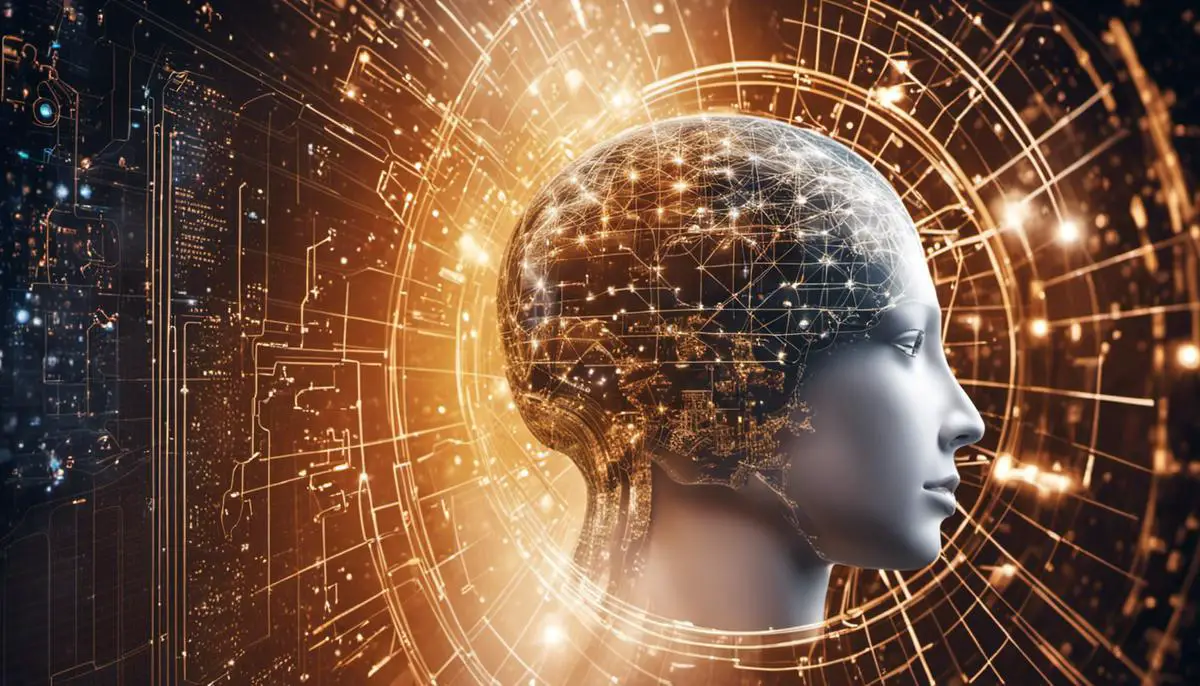In the rapidly evolving digital landscape, Artificial Intelligence (AI) emerges as a revolutionary force, restructuring various sectors and changing the face of web development. With its remarkable ability to automate complex tasks, create intuitive interfaces, and deliver real-world applications, the incorporation of AI in web development unlocks new dimensions of efficiency and innovation. However, as transformative as these advancements may seem, they are not without their challenges. These include cost implications, data privacy concerns, the steep learning curve for developers, and others. Our foray into this exciting realm of AI and web development seeks to offer comprehensive insights into its remarkable benefits, the challenges to surmount, and a glimpse into the promising future of AI-enabled web development.
Understanding AI and Its Impact on Web Development
Artificial Intelligence: Transmuting the Web Development Ecosystem
Today’s digital age is witnessing an undeniable paradigm shift powered by Artificial Intelligence (AI). This groundbreaking technology is transcending industries–from healthcare to finance to ecommerce and, of course, web development. As intriguing as it sounds, AI is a potent force reshaping the web development landscape in profound ways. Here’s how.
Introducing AI-Based Web Development
Broadly, AI’s application in web development revolves around optimization and automation. Websites are a crucial component of a business’s online presence. Consequently, ensuring excellent user experience (UX) becomes a non-negotiable mandate. Enter AI. It’s charging to the forefront, allowing developers to create websites that offer state-of-the-art UX with personalized responses and choices.
Driving User Experience to Unprecedented Heights
AI technologies like Machine Learning (ML) facilitate seamless content identification and classification. This holds significantly true for extensive sites with voluminous data. It enables the user to easily locate desired information without sifting through irrelevant content.
Moreover, AI leads a transformative path to personalized web development, primarily via intelligent algorithms capable of analyzing user behavior in-depth. By comprehending user preferences, AI helps enhance user interaction, eventually concocting a bespoke web experience that’s not just alluring but also considerably engaging.
Revolutionizing Web Design with AI
AI is no longer the extraterrestrial concept it once was. It’s here, actively altering the web design sector. AI-powered web design tools like The Grid and Wix’s ADI are transcending traditional design boundaries, featuring AI-driven algorithms that analyze user-provided data to construct functional, visually appealing websites.
Boosting Accessibility with AI
In addition to UX and design, AI is a catalyst in fostering website accessibility. AI programs increasingly assist in accessibility audits. They spot and fix elements that might impede the user’s interaction with the website, like low contrast ratios or missing alternative text—an unprecedented advancement for users with disabilities.
Enabling Real-Time Assistance with AI Chatbots
Embedding AI in web development has ushered in the era of AI chatbots that mimic human conversation patterns. Chatbots present users with instant, personalized responses, significantly reducing waiting times, while enhancing user satisfaction and engagement.
Promoting Data Protection through AI
Web development is not just about user experience; data safety is equally paramount. AI systems effectively monitor and manage data, identifying potential threats and neutralizing them to ensure robust data protection.
In Conclusion
AI isn’t just another buzzword anymore; it’s an omnipresent reality. Striding with giant leaps, it has the potential to revolutionize the web development landscape further. The dawn of AI-driven web development is not just reshaping the way websites are designed and optimized but is propelling a transformative shift towards a more accessible, personalized, secure web experience. In the realm of web development, AI isn’t merely an adjunct. It’s the future.
Now is not the time to watch passively from the sidelines. Get in the game. Get to know AI. Harness its potential. Welcome to a brave new world of AI-powered web development.

The Challenges of Incorporating AI in Web Development
Title: Exploring the Challenges of Implementing AI in Web Development
Unleashing the power of Artificial Intelligence (AI) in web development has paved the way for groundbreaking enhancements, from revolutionizing web design to driving unparalleled user experience, promoting data protection, and enabling real-time assistance. However, using AI for web development is not without its hurdles. Despite the transformative potential of AI in the web universe, several challenges might impede its seamless execution.
One of the primary obstacles is the Cost of Implementing AI. Despite the fact that AI in web development can take productivity and efficiency to unprecedented levels, it requires substantial monetary investment. This significant capital is not only for acquiring AI-based technology and applications but also for maintaining, monitoring, and updating them to keep up with the rapidly evolving AI landscape. Therefore, for small businesses and startups, this can be a relatively steep barrier to tackle.
The Complexity of AI Technology is another substantial hurdle. Despite the advanced capabilities of AI, it is still a complex technology to understand and implement. Professionals need to have a solid understanding of not just programming, but also AI principles, machine learning algorithms, neural networks, and more. This steep learning curve can deter web development teams from incorporating AI, particularly if they don’t have the time or resources to invest in extensive training.
Inadequate Data Quality can impede AI implementation in web development. Machine Learning and AI applications rely on vast amounts of data for training and functioning. However, the effectiveness of these AI tools depends on the quality of the data fed into them. If the data is inaccurate, incomplete, or biased, the output will be flawed, leading to substandard user experiences and decreased trust in the AI-enabled website.
Ethical and Legal Concerns surrounding AI in web development are also prominent hurdles. AI driven tools can potentially be used to gather sensitive information on users’ online behavior, raising privacy concerns. Web developers need to ensure AI integration complies with global data protection rules and respects user privacy. Any violation can result in severe penalties and damage to a company’s reputation.
Lastly, the problem of Human Skepticism towards AI can’t be neglected. Despite the many advantages of AI, some end-users remain skeptical about the privacy and ease-of-use of AI-enabled websites. It is crucial for developers and businesses to bridge this trust gap through clear communication, user education, and by ensuring transparency in their AI practices.
In conclusion, while AI in web development promises a slew of opportunities to enhance user experience, there are significant challenges to its implementation. By acknowledging and addressing these hurdles head-on, web developers, businesses, and tech enthusiasts can more effectively leverage AI’s potential and truly manifest a future where technology and humanity intersect seamlessly.

The Future of AI in Web Development
The advancement of artificial intelligence (AI)
exhibits immeasurable potential for the future of web development. Not only has AI jestingly pinned traditional web development techniques against the ropes, it’s gleefully ushering in a new era of interactive and smart web experiences. However, amidst its incredible capabilities, the complexity of AI technology arises as a critical challenge. Implementing AI into web platforms is a relatively complex process. AI’s intricate algorithmic nature and the advanced skill set required to maneuver its components can turn the route towards implementation into a labyrinth. Needless to say, this demands the knowledge and experience of proficient developers who understand AI’s inner workings. Additionally, the necessity for a completely new set of hardware specs further magnifies the complexity. On the brighter side, this challenge offers an opportunity to empower developers with new skills and knowledge, ultimately advancing the web development profession as a whole.The cost factor also figures prominently. The marriage of web development and AI isn’t always an affordable union for most companies – especially small to medium-sized businesses. The costs associated with obtaining the required tech and nurturing the needed talent can stretch budgetary constraints. Although this may currently seem discouraging, the eventual outcome can significantly cut down operational costs and improve efficiency.
Underpinning the effectiveness of AI is the availability of high-precision data, yet inadequate data quality can be a significant stumbling block. The rule with AI is: If you feed it junk, you’ll get junk in return. While the internet is a goldmine of data, acquiring quality, relevant, and clean data suitable for training AI models can be a substantial obstacle.
One not to be underrated aspect of integrating AI into web development is the existing ethical and legal concerns. Who gets held accountable if an AI system makes a wrong or harmful decision? How can we ensure AI respects user privacy and confidentiality? These concerns need to be robustly addressed with definitive laws, a crucial task lying ahead for lawmakers and web developers.
Finally, there’s the elephant in the room – human skepticism towards AI. As web developers, it’s imperative to remember that not everyone might feel comfortable with the idea of machines intercepting human tasks for them on the web, even if it’s to their benefit. Therefore, the essential need for being transparent about the use of AI, protective of user data, and mindful of user comfort is paramount.
In conclusion, despite the challenges and concerns, the continuous evolution of AI is undeniably shaping the future of web development. Progress might be a bit rough around the edges initially, but it always moves forward, guided by the light of innovation and improvement.

If the current trends are any indication, the future of AI in web development holds an exciting promise, with novel applications and endless possibilities. The rise of more sophisticated AI forms, such as machine learning and deep learning algorithms, paves the way for increased efficiency and innovative digital solutions. This prospective leap into a digitally-transformed future through AI necessitates staying informed, adaptive, and ready for changes. Embracing the inevitable role of AI in web development means not only riding this wave of digital revolution but crafting and shaping its course, leading to more intuitive, efficient, and innovative web solutions for the benefit of all.
